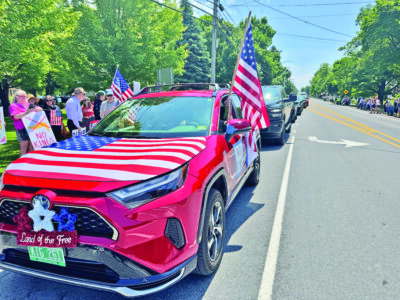Taking Care – Grandmother Hiles, Part 2

My Grandmother Hiles and Auntie Pasco, her companion of 50 years, were inveterate travelers in the early 1900s. A worn postcard recently surfaced, written to father in spidery handwriting from his mother: “Unable to attend your Yale graduation. We’re riding camels in the Gobi Desert. Hope to catch up eventually.”
Every three or four years Grandmother and Auntie Pasco would return to renew their visas and take a breather. They would blow in for prolonged stays of many weeks. Their large wooden steamer trunks fastened with leather straps on the hump backs would be brought to the guest room. The household suddenly revolved around them: theater tickets were purchased, afternoons included special Ebinger cookies and teatime treats; friends were invited for meals; aunts, uncles and friends traveled long distances to visit.
Nothing was too lavish.
By the end of the stay, Mother would be visibly tired. They seemed oblivious that they might be causing any strain on the household staff, although Auntie Pasco, who was pragmatic, was more aware. But Father adored them and wanted their time with us to be special. Perhaps he deemed this important, having seen so little of his mother growing up.
One year Grandmother and Auntie Pasco took a Dutch steamer up the Sampa River in New Guinea. A tribal chief who had never seen a white woman boarded their boat. Grandmother recounted: “Being in need of another wife, he promptly offered to buy Pasco in exchange for a pig. But of course I refused the offer.” At this, without fail, both threw back their heads, laughed and laughed, before finally inhaling from their cigarettes in the long holders of the time.
Some years later when the same story was told, the tribal chief was a headhunter, who offered a herd of pigs for Pasco. In this rendition, he wanted to add a white woman’s scalp to his collection. At times like these, I noticed Mother was barely listening. I wondered if she thought they made this up or had heard it too many times. Yet, Grandmother told it so skillfully I became nervous until the end, when she turned down the chief.
During that same period that Grandmother and Auntie Pasco were on a tramp steamer, while it was tied up at the dock to load cargo, an intruder crept into their cabin at night. They had obtained a cockatoo bird kept in his cage. “Van Heems, get him!” Auntie Pasco hissed. He flew from his cage and bit the burglar on the nose, who ran away screaming. The next morning the captain told them that the thief had a long knife, was looking for money and might have stabbed them.
However, the adventure they prized the most was seeing the digs of the famous archeologist Wooley, who was uncovering the early structures in Mesopotamia called ziggurats.
Women were not allowed to enter the country, but that didn’t phase Grandmother and Auntie Pasco. They colored their skin dark with beetle nuts, then donned caftans and cloth headdresses to pass as Arab men. We have a grainy movie showing them indistinguishable from the Arab men, laughing and bobbing their heads as if in a Charlie Chaplin skit and, of course, smoking cigarettes. I found this spooky and wondered how they would have escaped if the Arabs had kidnapped them. I knew Father would not have been amused at trying to stage a rescue.
When they reached their seventies, Father told them they were not traveling abroad again. If they died in some remote spot he might never find them. By this time, I had begun to savor their outrageous stories and thought Father strict to limit their travel.
So they lived their last years in small attractive houses in Tryon, North Carolina, and Sharon, Connecticut, which seemed lighter than 82 Remsen Street, and created gardens filled with brightly colored flowers. Grandmother applied her lifelong love of architecture to rearranging the interiors. They continued to embroider and told their audacious life stories until the end.
They’ve passed on their passion for travel onto the next generations—although none of us have had such unbelievable experiences.
Related Stories
Popular Stories
If you enjoy The Charlotte News, please consider making a donation. Your gift will help us produce more stories like this. The majority of our budget comes from charitable contributions. Your gift helps sustain The Charlotte News, keeping it a free service for everyone in town. Thank you.
Andrew Zehner, Board Chair







